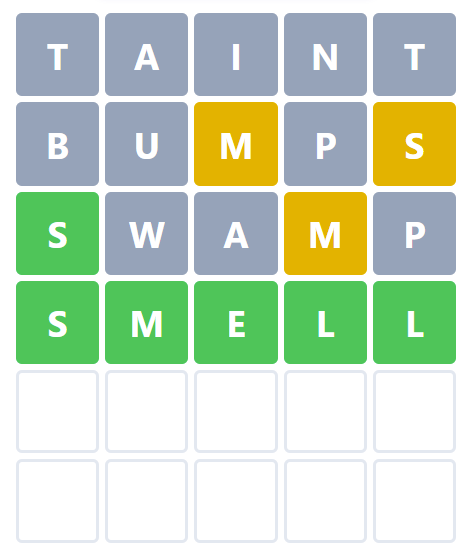Admit it– we’re all hooked on Wordle. It’s annoying and cluttering up everyone’s social media, but we can’t stop doing the daily puzzle and checking our scores against our friends. So if we’re stuck with it for a while, we might as well try to learn something from it.

Why do we care about the Wordle acquisition?
When I pick a firm or investment to investigate, value, or “care about” more generally, I tend to have a simple investment thesis in mind before I do any analysis or math. There are simply a lot of investment choices out there, so it helps to have a qualitative investment idea in mind beforehand. Otherwise, you might end up doing a bunch of valuation exercises on investments that are fairly valued in the market.
I got interested in Wordle’s finances when I read that it was sold for a figure in the low seven digits. Wordle isn’t investable, so this isn’t exactly an investment thesis, but my initial idea that got me interested in investigating Wordle is:
Investment Idea: There is no way in hell that something as famous as Wordle is only worth a few million dollars.
I think the NYT got a bargain here! But that’s an initial reaction. I don’t really know how the market for app startups works, so I can’t really say for sure. How can I back my intuition up with something more objective?
How can we come up with a fair valuation?
There are a few main methods to value a company. You can compare it to other companies that have public valuations. You can compare it to other companies that have private, but known or estimated, valuations. You can forecast out the financial performance of the firm and come up with a fundamental valuation based on future cashflows to shareholders. To keep this simple, I’m going to compare the Wordle valuation to other similarly sized web apps that have been funded or acquired recently. But first, a few words on why, exactly, a free web app is worth anything at all.
What makes Wordle valuable
- It’s viral.
- It has a few million daily users according to the NYT acquisition article.
- It’s free right now but you could charge for it one day. Maybe. I doubt it.
- You could mine user data and sell it to 3rd parties.
- You could add an advertising banner to the game page and earn ad revenue.
- You could license other firms to use the Wordle format for other spinoff games.
- You could be an asshat and sue other people that copied Wordle to make their own games.
How will we approach our back-of-the-envelope valuation of Wordle?
I think the simple way to get a rough idea of a fair valuation for Wordle is to look at other web apps that are the same size, and compare their valuations. This is called relative valuation. Relative valuation has the advantage of being grounded in market realities. On the other hand, the disadvantage of relative valuation is that it isn’t based in any objective mathematical principle. So, if the market is being dumb, relative valuation is going to lead you to be equally dumb. I’m OK with that tradeoff in this situation.
I did some very brief and unscientific googling and found the following recent web app valuations.
- Rec Room – online gaming platform – March 2021 valuation of $1.25bn with 2mn users
- Bunch – social gaming startup – $20mn funding round in 2020, so maybe a $100mn to $200mn valuation? – 1mn+ users
- Rooter – online gaming – Jan 2022 funding round of $25mn, so maybe a $120mn – $240mn valuation? – 8.5mn users
Applying these (extremely unscientific) comps to Wordle
Let’s create a metric, valuation dollars per user. Note that I’m not getting into the weeds about daily or monthly user, etc. This is a very rough valuation.
- Rec Room – 1,250,000,000 / 2,000,000 = $625 per user
- Bunch – 150,000,000 / 1,000,000 = $150 per user
- Rooter – 180,000,000 / 8,500,000 = $21.28 per user
Wordle has a few million daily users– lets just call it 2mn. So, even using the cheapest comp, Rooter, our little napkin valuation has Wordle at 2,000,000 * 21.28 = $42.6mn. I’m not saying Wordle is worth that much. But I do think that its worth more than “low single digit millions!” I’m glad the creator got to cash out but I think he could have done better!
Discover more from Luther Wealth
Subscribe to get the latest posts sent to your email.
